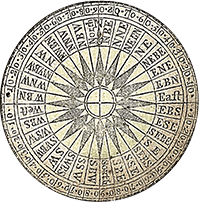Puritan Pastor Jonathan Edwards is often associated with just one of his sermons titled, “Sinners in the Hands of an Angry God.” While the title of the sermon sets off some negative vibes and leaves a stereotypical impression to some, Edwards was more…. much more.
Edwards came from a faith based background. He entered Yale College in 1716 at just under the age of 13. In 1727, Edwards was ordained minister at Northampton and assistant to his grandfather Solomon Stoddard, a noted minister. He was a scholar-pastor, not a visiting pastor. In the same year, he married Sarah Pierpont. Then 17, Sarah was from a notable New England clerical family: her father was a founder of Yale College (at that time it was a Divinity school); and her mother was the granddaughter of Thomas Hooker. Hooker was a prominent English colonial leader and Congregational minister, who founded the Connecticut Colony after dissenting with Puritan leaders in Massachusetts. Sarah is described as a very supportive wife, and the mother of his 11 children.
Jonathan Edwards was a thinking man’s thinker. His work was intertwined with psychology, theology, and philosophy. Edwards purposely delivered his sermons in a controlled monotone. While he did so, there is no doubt that the images from his words were effective… he became a driving force in revivals and America’s great awakening.
Many people were concerned that the emotions released by revivals were dangerous. Ultimately, he was eventually removed from his pastoral position. After that, (1751) he spend a great deal of time at a frontier post called Stockbridge in Massachusetts, and spent time as a frontier pastor and missionary to the Indians.
In 1754, Edwards wrote “Freedom of Will” which postulated that free will is simply the souls prevailing inclination for the greatest good. He put fort an argument and explanation of how that humans are free to do as they please, and God therefore rightly holds them morally responsible for the quality of their volitions as expressions of their desires and intentions.
In 1757 Edwards had finished his Great Christian Doctrine of Original Sin Defended (1758), which defended Calvinistic theology and defended it by citing biblical statements about the corruption of the human heart and arguing that the universal commission of sinful acts points to a sinful predisposition in every person.
Edwards later (1765) published dissertations: Concerning the End for Which God
Created the World and The Nature of True Virtue. Here Edwards defined true virtue as love toward God as being general. He felt that true virtue did not spring from love to self, family, nation, or even humankind.
Edwards is credited with several other publications… including:
*The Freedom of the Will
*A History of the Work of Redemption including a View of Church History
*The Nature of True Virtue
*Original Sin
*Some Thoughts Concerning the Present Revival in New England and the Way it Ought to be Acknowledged and Promoted
He applied what he learned thru academic and life experiences to develop a full understanding of Christ’s redemption. He was successfully able to share an understanding of sin and redemption to the common man.
Late in 1757, however, Jonathan Edwards accepted the presidency of what became eventually Princeton University. At that time, it was a Divinity school. He arrived there in January. He had hardly assumed his duties when he contracted smallpox from an inoculation and died in 1758.
When we see “Sinners at the Hand of an Angry God”, some of us form an impression that draws on the stereotypes of rigid Puritanism. However, a full understanding of Edwards and his theology reveals that he was not a stoic fire and brimstone preacher. He was a man that personally experienced the redemptive power and love of Jesus Christ in his life.
Welcome to “Sharing the Stories of History with Tim Mann”!
Meet Timothy A. Mann, a passionate historian born and raised in the heart of Shelby County, Ohio where Tim’s roots run deep in the rich soil of American history. As the author of articles and books, including “Frontier Miscellany Concerning the Miami County Ohio Militia,” “Colonel John Mann, His Kith and Kin,” and “Frontier Militia – The War of 1812,” Tim’s literary contributions have enlightened and inspired countless history enthusiasts.








